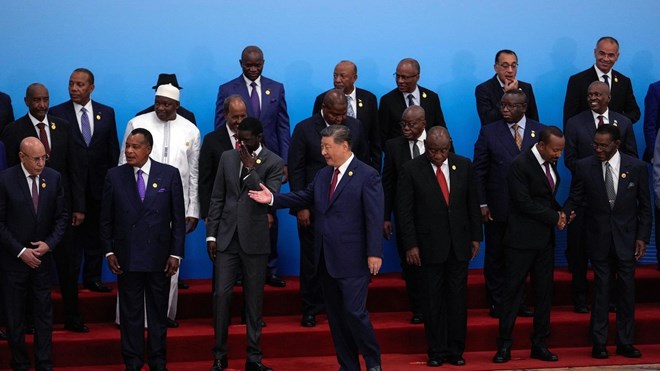
Sunday September 8, 2024

China's President Xi Jinping, centre, shows the way to leaders from African countries as they proceed to the opening ceremony of the China Africa Forum after a group photo session at the Great Hall of the People in Beijing, China on September 5, 2024. REUTERS
Mogadishu (HOL) — Chinese President Xi Jinping has pledged $51 billion in new financial support for African countries over the next three years, focusing on job creation, infrastructure development, and clean energy projects. The commitment, announced during the Forum on China-Africa Cooperation (FOCAC) in Beijing, is part of China's efforts to strengthen ties with the continent amid global economic challenges and geopolitical tensions.
Xi outlined that 30 infrastructure projects to improve connectivity across Africa will be launched, along with 30 clean energy initiatives designed to address the continent's chronic energy shortages. Additionally, China says it will create at least one million jobs as part of its economic collaboration with Africa, a move that Xi framed as vital for Africa's industrialization and development.
"We have built roads, railways, schools, and hospitals together, and these projects have changed the lives of many," Xi said in his address to delegates from more than 50 African nations. He emphasized China's commitment to fostering a "shared future" with Africa and championing development in the Global South.
According to Chinese state media, of the $51 billion, roughly $29.6 billion will be provided through credit lines, while $9.9 billion will be injected as direct investments from Chinese companies. The remaining funds will support smaller projects and military aid. China's pledge will include significant investment in Somalia's Blue Economy sector.
While Xi avoided direct discussion of Africa's debt challenges, many of which involve Chinese loans, the forum's action plan includes provisions for potential repayment postponements. Observers have criticized China for contributing to unsustainable debt burdens in some African nations through its Belt and Road Initiative. However, African leaders, including South Africa's Cyril Ramaphosa, have rejected this narrative. Ramaphosa stated that China's investments are not intended to trap countries in debt but rather to promote mutual development.
China, Africa's largest trading partner, has played a key role in Africa's infrastructure development, pledging over $191 billion between 2006 and 2021. The latest round of financing seeks to expand on these efforts but with a shift toward smaller, more targeted projects. Beijing aims to boost Africa's green energy capabilities, as evidenced by the 30 new clean energy projects that will focus on solar, wind, and hydroelectric power.
Xi's promises come as China faces growing economic pressures at home, including a property market slowdown and demographic challenges. At the same time, Beijing is trying to counter increasing diplomatic competition from Western nations, particularly the United States, which is also seeking stronger ties with Africa as part of the global push for resources critical to the green energy transition.
However, Africa's markets remain divided and small compared to Western nations, raising questions about the scale of Chinese investments and their long-term sustainability. Analysts suggest that while Africa presents opportunities, it may not be able to absorb China's surplus capacity for green technology products, like solar panels and electric vehicles, which are currently facing trade barriers in the U.S. and Europe.
Nonetheless, Xi's pledges at FOCAC signal that China remains committed to being Africa's top partner. Leaders from nations like Kenya, Nigeria, and Zambia welcomed the new commitments, particularly in areas like transportation, energy, and industrialization.